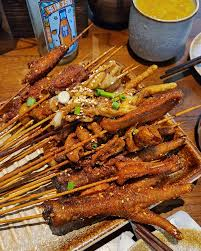I will fly off to KL tomorrow for a few days of cafe hopping and wandering at bookstores. The KL scene has become much more vibrant for bookstores as Singapore has been losing them to our well-run libraries. I foresee a future trip to Bangkok to visit game stores and KL to bookshops.
Today's article is about chain combo-ing some books to derive insights. I was fortunate to read these books in a row, and they enriched my personal experiences during my short break after conducting my 34th installation of the Early Retirement Masterclass.
Let's begin with Josh Tolley's Acquisitional Wealth, a novel personal finance book that folks should read. Initially, it reads a little like Robert Kiyosaki, but then it takes a detour into the world of small business M&As. Tolley believes that instead of the usual work, saving and investing in mutual funds, folks might be better off buying businesses from small business owners. There are many non-cyclical businesses like a car wash or a laundromat with owners seeking to retire, and you can buy them just like a value investor should. One major issue is that you often have to borrow money to purchase such businesses, and the acquisition process requires months and the services of a good accountant and lawyer.
I enjoyed this book so much that I started googling for business brokers in Singapore. After a while, I realized that our markets are so severely beaten down that we can find illiquid companies trading at 3-5 PE, so there might not be a need to buy a business. The book's biggest glaring weakness is that it does not say much about valuation, which can be remedied by reading textbooks by Aswath Damodaran. If you are considering expanding your mind beyond the usual investments, consider taking this book out for a spin.
I give my brain a break after a finance read because I'm getting mellower and becoming more interested in human matters. Books should trigger pleasant memories, stimulate ideas for travel, and teach you a thing or two about life.
Chinese Espresso by Grazia Ting ticks all the boxes. It is an ethnographic study of Chinese immigrants from Wenzhou who are now owners of espresso bars in Italy. This book made me want to travel to Bologna, Italy, with my posse next, given that I had a fun trip to Istanbul after reading the history of the Byzantine Empire. The idea is to meet ethnic Chinese who speak fluent Italian and Mandarin and are forced by circumstances to buy coffee bars to survive in Italy.
For a book like this, it's good to be exposed to the racism faced by Chinese immigrants, but it is also a fascinating read about coffee. The author worked as free labour for these espresso bars and discussed how difficult it was to generate the foam with evenly sized bubbles for a cappuccino.
But what's really valuable for the finance-obsessed is how ethnic Chinese think about business operations. The Wenzhounese can dominate the coffee bar trade because they see their kids as free labour. The profit from an espresso bar operation does not account for labour costs as it is family-run, and profits are for the whole family, with the patriarch using his funds to buy up other espresso bars for their married children. The Wenzhounese, the most entrepreneurial of all the Chinese dialect groups, already operate on acquisitional wealth the way Josh Tolley would have wanted.
This completes the circle of books I read these few weeks, one book on theoretical ideas on small business M&A and another, an intimate description of small businesses in Italy.
I relate what I learn to my ordinary life. After conducting my course, I have two days when my wife and kids are with their in-laws in Malaysia, so I decided to hang out with a friend over the long weekend. He used to hang out in a Japanese pub that had closed down, so he wanted to just drink with the ex-staff, but all I wanna do is to sing.
So I followed him to a weird corner in Jurong East called Vision Exchange, an ethnic enclave of PRC immigrant workers with an entire row of Chinese eateries.
We picked a quiet eating place, and prices were super competitive; 15 sticks of Chuan Chuan were sold for just $10. Compare that with our local equivalent of 10 satay sticks for $13 at Pasar Malam.
[ On a separate note, I spent $13.50 on Chuan Chuan, then I sang for 3 hours in a karaoke lounge with one drink for $6. My total damage that evening was less than $20. ]
With such a price point, it is no accident that Mala eateries have also begun to dominate the local F&B scene the same way the Wenzhounese have acquired the espresso bars in Italy.
Immigrants are willing to struggle as locals cannot chiku (eat bitter); they are willing to exploit themselves to sell cheaper food to us. With a Mandarin-speaking majority, Singapore is much more attractive to the PRC than Italy.
But, of course, there are plenty of parallels between local Singaporeans and Italians. When Italians see the PRC, they think that the Chinese are part of a mafia group. We tend to see them as money launderers.
If there is any lesson to learn from my reading adventures, personal finance readers owe a lot to sociologists, and we should read their books more. One classic is The Millionaire Next Door by Thomas Stanley, who inspired me to go all the way to hunt for cheap chuan chuan in the first place.



No comments:
Post a Comment